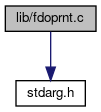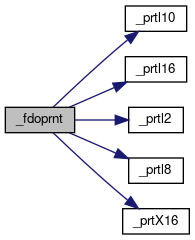#include <stdarg.h>
Include dependency graph for fdoprnt.c:

Go to the source code of this file.
Macros | |
| #define | MAXSTR 80 |
| #define | NULL 0 |
Functions | |
| void | _fdoprnt (char *fmt, va_list ap, int(*func)(int, int), int farg) |
| static void | _prtl10 (long num, char *str) |
| static void | _prtl16 (long num, char *str) |
| static void | _prtl2 (long num, char *str) |
| static void | _prtl8 (long num, char *str) |
| static void | _prtX16 (long num, char *str) |
Macro Definition Documentation
◆ MAXSTR
| #define MAXSTR 80 |
Definition at line 5 of file fdoprnt.c.
Referenced by _fdoprnt().
◆ NULL
| #define NULL 0 |
Definition at line 6 of file fdoprnt.c.
Referenced by _fdoprnt().
Function Documentation
◆ _fdoprnt()
| void _fdoprnt | ( | char * | fmt, |
| va_list | ap, | ||
| int(*)(int, int) | func, | ||
| int | farg | ||
| ) |
Definition at line 20 of file fdoprnt.c.
References _prtl10(), _prtl16(), _prtl2(), _prtl8(), _prtX16(), MAXSTR, NULL, and va_arg.
Referenced by sprintf().
#define va_arg(va, type)
可変長引数の値を返し、次の引数へ進む。 「va_start()とva_end()の間」もしくは「va_copy()とva_end()の間...
Definition: stdarg.h:34
Here is the call graph for this function:

Here is the caller graph for this function:

◆ _prtl10()
|
static |
Definition at line 251 of file fdoprnt.c.
Referenced by _fdoprnt().
Here is the caller graph for this function:

◆ _prtl16()
|
static |
Definition at line 302 of file fdoprnt.c.
Referenced by _fdoprnt().
Here is the caller graph for this function:

◆ _prtl2()
|
static |
Definition at line 352 of file fdoprnt.c.
Referenced by _fdoprnt().
Here is the caller graph for this function:

◆ _prtl8()
|
static |
Definition at line 276 of file fdoprnt.c.
Referenced by _fdoprnt().
Here is the caller graph for this function:

◆ _prtX16()
|
static |
Definition at line 327 of file fdoprnt.c.
Referenced by _fdoprnt().
Here is the caller graph for this function:

 1.8.13
1.8.13